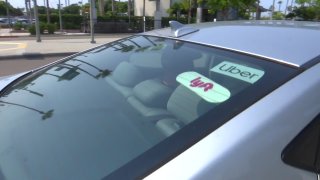
Uber, Lyft and other app-based ride-hailing and delivery services prevailed at the ballot box in their expensive gamble to keep drivers classified as independent contractors.
The titans of the so-called gig economy bankrolled the most expensive ballot measure in California history to exempt drivers from being classified as company employees eligible for benefits and job protections.
The measure had more than 58% of the nearly 11 million votes counted so far.
Proposition 22 pitted the gig companies, including DoorDash, Postmates and Instacart, against labor unions. More than $225 million was spent — the vast majority by the companies.
The ballot question overrides lawmakers and the courts to keep drivers independent and able to set their own hours. If the companies' had lost, it would have upended their business model and San Francisco-based Uber and Lyft had threatened to pull out of California.
The landmark state labor law known known as AB5 threatened to upend the app-based businesses, which offers flexibility to drivers to work whenever they choose. But drivers forgo protections like minimum wage, overtime, health insurance and reimbursement for expenses.
Local
Labor-friendly Democrats in the Legislature passed the law last year to expand a 2018 ruling by the California Supreme Court that limited businesses from classifying certain workers as independent contractors.
Uber and Lyft maintain that their drivers meet the criteria to be independent contractors, not employees. They also argue the law didn’t apply to them because they are technology companies, not transportation companies, and drivers are not a core part of their business.
State Attorney General Xavier Becerra took the companies to court and an appeals court recently upheld a ruling by a San Francisco Superior Court judge who said the companies need to treat drivers as employees subject to the new employment standards.
Proposition 22 exempts app-based transportation and delivery companies from the labor law to keep drivers independent contractors not required to receive overtime, sick leave and expense reimbursement.
It also will put in place policies that require those companies to provide “alternative benefits,” including a guaranteed minimum wage and subsidies for health insurance if they average 25 hours of work a week.
___
Find AP’s full election coverage at APNews.com/Election2020.




